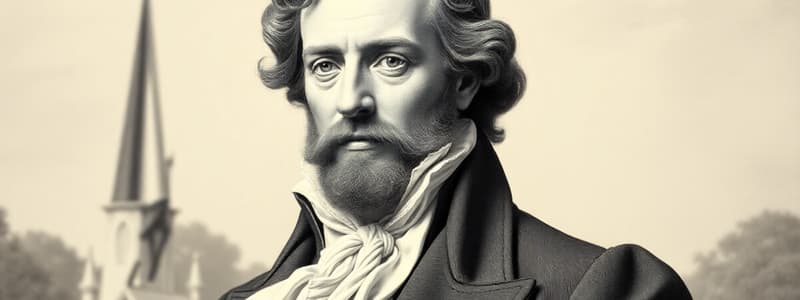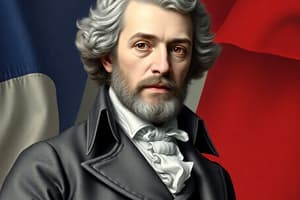Podcast
Questions and Answers
What is depicted in Frédéric Sorrieu's first print from 1848?
What is depicted in Frédéric Sorrieu's first print from 1848?
The print shows people of Europe and America marching towards the Statue of Liberty, honoring it with the torch of Enlightenment and the Charter of the Rights of Man.
How does Sorrieu's vision represent the concept of nationalism?
How does Sorrieu's vision represent the concept of nationalism?
Sorrieu groups people as distinct nations, identified by their flags and national costumes, symbolizing unity among nations.
What major political change occurred in France as a result of the French Revolution in 1789?
What major political change occurred in France as a result of the French Revolution in 1789?
The transfer of sovereignty from the monarchy to the citizens of France took place.
What was the significance of the tricolour flag introduced during the French Revolution?
What was the significance of the tricolour flag introduced during the French Revolution?
What role did women play in the liberal movement after the French Revolution?
What role did women play in the liberal movement after the French Revolution?
What was the impact of Napoleon's Civil Code of 1804 on societal privileges?
What was the impact of Napoleon's Civil Code of 1804 on societal privileges?
How did nationalism influence the political landscape of Central and Eastern Europe after 1848?
How did nationalism influence the political landscape of Central and Eastern Europe after 1848?
What symbols are present in Sorrieu’s artwork that represent fraternity among nations?
What symbols are present in Sorrieu’s artwork that represent fraternity among nations?
What role did Otto von Bismarck play in the unification of Germany?
What role did Otto von Bismarck play in the unification of Germany?
How did the Act of Union in 1707 affect Scotland's relationship with England?
How did the Act of Union in 1707 affect Scotland's relationship with England?
What symbolized the new British identity following the formation of the United Kingdom?
What symbolized the new British identity following the formation of the United Kingdom?
What was Giuseppe Mazzini's contribution to the unification of Italy?
What was Giuseppe Mazzini's contribution to the unification of Italy?
In what year was Victor Emmanuel II proclaimed king of united Italy?
In what year was Victor Emmanuel II proclaimed king of united Italy?
What impact did nationalism have on Europe in the late 19th century?
What impact did nationalism have on Europe in the late 19th century?
What was the main outcome of the Prussian victory over Austrian forces in 1859?
What was the main outcome of the Prussian victory over Austrian forces in 1859?
How did the representation of nations as female figures relate to nationalism?
How did the representation of nations as female figures relate to nationalism?
What challenges did anti-imperial movements face in forming independent nation-states?
What challenges did anti-imperial movements face in forming independent nation-states?
What were the primary forces that drove the modernization of the Balkan region during the 19th century?
What were the primary forces that drove the modernization of the Balkan region during the 19th century?
Flashcards
Sorrieu's vision
Sorrieu's vision
A 19th-century artist's depiction of a world of democratic and social republics, with nations peacefully coexisting.
Nationalism's impact
Nationalism's impact
Nationalism brought significant political and social changes, leading to the emergence of nation-states in Europe.
French Revolution
French Revolution
Event that sparked nationalism in Europe, shifting power from monarchs to citizens.
Napoleonic Code
Napoleonic Code
Signup and view all the flashcards
La patrie
La patrie
Signup and view all the flashcards
Nation-state
Nation-state
Signup and view all the flashcards
1848 European Changes
1848 European Changes
Signup and view all the flashcards
Women's Role in Nationalism
Women's Role in Nationalism
Signup and view all the flashcards
German Unification
German Unification
Signup and view all the flashcards
Otto von Bismarck
Otto von Bismarck
Signup and view all the flashcards
Italian Unification
Italian Unification
Signup and view all the flashcards
Sardinia-Piedmont
Sardinia-Piedmont
Signup and view all the flashcards
Balkan Region
Balkan Region
Signup and view all the flashcards
Nationalism
Nationalism
Signup and view all the flashcards
Imperialism
Imperialism
Signup and view all the flashcards
Act of Union (1707)
Act of Union (1707)
Signup and view all the flashcards
Visualizing the Nation
Visualizing the Nation
Signup and view all the flashcards
Study Notes
Frédéric Sorrieu's Vision of a United Europe
- Sorrieu, a French artist, created prints visualizing a world of democratic and social republics in 1848.
- His prints depicted a procession of people from Europe and America, paying homage to Liberty.
- The procession included figures representing various nations, each with their flags and national costumes.
- The procession was led by the United States and Switzerland, followed by France and Germany, Austria, Kingdom of the Two Sicilies, Lombardy, Poland, England, Ireland, Hungary, and Russia.
- The scene included a female figure representing Enlightenment, carrying torch and Charter of Rights of Man.
- Absolutist symbols were depicted as shattered, representing their demise.
- Christ, saints, and angels appear above, symbolizing fraternity between nations.
The French Revolution and the Idea of the Nation
- The French Revolution (1789) fostered nationalism, shifting sovereignty from the monarchy to citizens
- Concepts like "la patrie" (fatherland) and "le citoyen" (citizen) were introduced.
- The tricolour flag replaced the former French flag.
- Napoleon destroyed democracy in France.
- The Napoleonic Code (1804) abolished birth privileges, established equality, and protected property rights.
- Middle class dominated the parliament; many women participated in liberal movements.
- Women formed political associations, ran newspapers, and participated in political activities, though denied suffrage.
- Autocratic monarchies in Central and Eastern Europe adopted reforms after 1848, abolishing serfdom and bonded labour.
The Making of Germany and Italy
- Nationalism shifted focus after 1848, leading to the unification of Germany and Italy.
- Prussia, led by Otto von Bismarck (its chief minister), orchestrated Germany's unification using the Prussian army and bureaucracy.
- William I was proclaimed German Emperor in January 1871.
- Modernization of German currency, banking, legal, and judicial systems occurred.
- Italy, divided into seven states, saw Sardinia–Piedmont, ruled by an Italian princely house, as a leading state.
- Giuseppe Mazzini formed the Young Italy secret society.
- Sardinia-Piedmont defeated Austrian forces in 1859, gaining support from local peasants.
- Victor Emmanuel II became King of unified Italy in 1861.
The Strange Case of Britain
- Britain, prior to the 18th century, lacked a defined "British" nation.
- Its influence increased due to wealth, growth, and power.
- The Act of Union (1707) merged England and Scotland into the United Kingdom, with England dominant.
- Ireland was forcefully incorporated into the UK in 1801.
- British symbols (flag, anthem, language) were promoted to establish unity.
Visualising the Nation
- Artists during the 18th and 19th centuries presented countries as individuals, and nations as female figures.
- French Revolution saw female figures representing Liberty, Justice, and the Republic.
- Liberty was symbolized by a red cap or broken chain, and Justice by a blindfolded woman carrying scales.
Nationalism and Imperialism
- Intense rivalry over trade, colonies, naval power, and military might arose among European powers after the last quarter of the 19th century.
- The Balkans, encompassing several modern-day countries, became a highly tensioned area after 1871.
- The Ottoman Empire's influence in the Balkans escalated conflicts.
- Nationalism, combined with imperialism, characterized the disaster of 1914 in Europe.
- Anti-imperial movements struggled to establish independent nation-states, but this concept was widely accepted.
Studying That Suits You
Use AI to generate personalized quizzes and flashcards to suit your learning preferences.
Description
Explore the artistic representation of a united Europe through Frédéric Sorrieu's prints from 1848. This quiz delves into the themes of nationalism, liberty, and the influences of the French Revolution on ideas surrounding nationhood and citizen sovereignty. Test your understanding of these historical concepts and their visual expressions.




